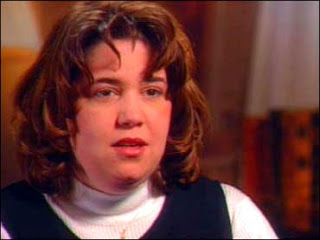
The woman in the photo is Christine Pelton, a former Biology teacher at Piper High School in Piper Kansas. Ms. Pelton became the center of an international story in 2002 when she caught 28 sophomore students plagiarizing on a project for her class. The project in question was known as the “leaf project” by the students and was supposed to count for 50% of their semester grade in her class. As a result of getting caught, the 28 “cheaters” were going to fail the class for first semester; the incident occurring in December of 2001. Because of complaints from several parents the Piper School Board modified the teacher’s decision, resulting in 27 of the 28 students passing her class. Ms. Pelton resigned; leaving her position after the School Board rendered their decision.
If you “Google” Christine Pelton you will get more than 70,000 hits, all of the links I saw roundly demonized the school board and criticized the student and parents. Ms. Pelton is portrayed as a Christ-like figure, who was being crucified for sticking to her standards. She gave up her career for the sake of honesty. I guess I am the only one in the world, besides the parents who complained and the School Board, who disagrees.
In the case of the Piper High School cheating scandal the School Board made the correct decision, Ms. Pelton was wrong. By the way, I am not being sarcastic here.
Ms. Pelton is guilty of a common mistake second year teachers make—inappropriately over-weighting an assignment. No single assignment should ever be more than 10% of a semester grade in high school, 20% if it is a comprehensive semester exam. There is no way to justify a weighting of 50% on a “leaf collection” in Biology. It is disturbingly inappropriate and can’t be rationalized in terms of its alignment with the Kansas State Goals in Life Science—go ahead and try to justify it if you like, I dare you!!! I actually looked up the published Kansas Science Standards.
My biggest question is; where was her supervision? How did her principal, department chair, and fellow teachers allow her to implement this policy without at least trying to dissuade her from such a mistake? All of the turmoil; the public scandal, national spotlight, and disturbing drama of her resignation, could have been avoided if anyone had pulled her aside before it was too late and given her some guidance.
Most readers are probably outraged at the idea of letting the little cheaters get away with their crime; in fact, none of them did. As far as I can determine from my research, none of the 28 plagiarists got a passing grade on the project, they all failed it! Contrary to what most have been led to believe by the media circus that resulted, the school board did not change the failing grades on the project to passing. Rather, they changed the weighting of the project from 50% to a more appropriate 12%. The result of this change was that most of the students did not fail the semester while still failing the project. The board never said that plagiarism was OK only that the weighting of the assignment was inappropriate. The media misrepresented the board's decision to make for a better story, and in doing so, wrongly convicted the school board in the court of public opinion.
For those of you who still feel that the school board should have backed her up, teaching the cheaters a lesson, what about this? Suppose her punishment for cheating was having the students paddled? Would you still be arguing that the school board should have let them learn their lesson? If the school board acted to alter the punishment would you argue that they were telling the students that cheating was OK? Of course not, you’re sane. Certainly paddling is different from getting no credit for half the work in a semester—but both are inappropriate. The school board was correct, the cheaters deserved to fail the project (and did), and Ms. Pelton was let down by her supervisors and colleagues who wern't paying attention.
For those of you who feel sorry for Ms. Pelton for loosing her career, Education Week reported that she had signed a movie contract for her story.



